
"Blowin' in the Wind" is a song written by Bob Dylan in 1962. It was released as a single and included on his album The Freewheelin' Bob Dylan in 1963. It has been described as a protest song and poses a series of rhetorical questions about peace, war, and freedom. The refrain "The answer, my friend, is blowin' in the wind" has been described as "impenetrably ambiguous: either the answer is so obvious it is right in your face, or the answer is as intangible as the wind".
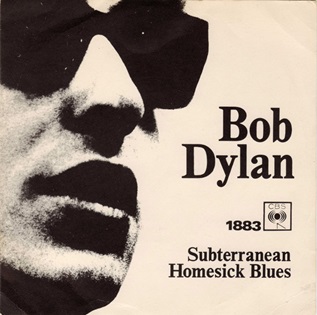
"Subterranean Homesick Blues" is a song by Bob Dylan, recorded on January 14, 1965, and released as a single by Columbia Records, catalogue number 43242, on March 8. It is the first track on the album Bringing It All Back Home, released some two weeks later. It was Dylan's first Top 40 hit in the United States, peaking at number 39 on the Billboard Hot 100. It also entered the Top 10 of the UK Singles Chart. The song has subsequently been reissued on numerous compilations, the first being the 1967 singles compilation Bob Dylan's Greatest Hits. One of Dylan's first electric recordings, "Subterranean Homesick Blues" is also notable for its innovative music video, which first appeared in D. A. Pennebaker's documentary Dont Look Back. An acoustic version of the song, recorded the day before the single, was released on The Bootleg Series Volumes 1–3 1961–1991.
"Shelter from the Storm" is a song by Bob Dylan, recorded on September 17, 1974, and released on his 15th studio album, Blood on the Tracks, in 1975. It was later anthologized on the compilation album The Essential Bob Dylan in 2000.

"Baby, Stop Crying" is a song written by Bob Dylan, released in the summer of 1978 as a single and in a longer album version on Street Legal. The song charted at #13 in the UK and was a top-ten song in much of Europe, although it failed to chart in the United States.
"Buckets of Rain" is a song by Bob Dylan, recorded on September 19, 1974, in New York City and released in 1975 on Dylan's critically acclaimed album Blood on the Tracks.

"The Times They Are a-Changin'" is a song written by Bob Dylan and released as the title track of his 1964 album of the same name. Dylan wrote the song as a deliberate attempt to create an anthem of change for the time, influenced by Irish and Scottish ballads. Released as a 45-rpm single in Britain in 1965, it reached number 9 on the UK Singles Chart. The song was not released as a single in the US. In 2019 it was certified Silver by BPI.

"Just Like a Woman" is a song by the American singer-songwriter Bob Dylan from his seventh studio album, Blonde on Blonde (1966). The song was written by Dylan and produced by Bob Johnston. Dylan allegedly wrote it on Thanksgiving Day in 1965, though some biographers doubt this, concluding that he most likely improvised the lyrics in the studio. Dylan recorded the song at Columbia Studio A in Nashville, Tennessee in March 1966. The song has been criticized for sexism or misogyny in its lyrics, and has received a mixed critical reaction. Some critics have suggested that the song was inspired by Edie Sedgwick, while other consider that it refers to Dylan's relationship with fellow folk singer Joan Baez. Retrospectively, the song has received renewed praise, and in 2011, Rolling Stone magazine ranked Dylan's version at number 232 in their list of the 500 Greatest Songs of All Time. A shorter edit was released as a single in the United States during August 1966 and peaked at number 33 on the Billboard Hot 100. The single also reached 8th place in the Australian charts, 12th place on the Belgium Ultratop Wallonia listing, 30th in the Dutch Top 40, and 38th on the RPM listing in Canada.

"I Want You" is a song by the American singer-songwriter Bob Dylan, which was released as a single in June 1966, and, later that month, on his seventh studio album, Blonde on Blonde. The song was written by Dylan, and produced by Bob Johnston. The song has been interpreted as a straightforward expression of lust, although critics have highlighted that the symbolism of the song is complex. It was the last song recorded for Blonde on Blonde, with several takes recorded in the early hours of March 10, 1966. It was included on Bob Dylan's Greatest Hits (1967). The song has received a largely positive critical reception, with a number of commentators highlighting Dylan's use of imagery, although some of the meanings are obscure.
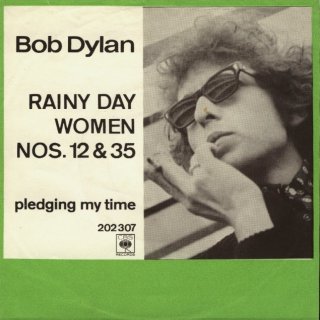
"Pledging My Time" is a blues song by the American singer-songwriter Bob Dylan from his seventh studio album, Blonde on Blonde (1966). The song, written by Dylan and produced by Bob Johnston, was recorded on March 8, 1966 in Nashville, Tennessee. Dylan is featured on lead vocals, harmonica, and guitar, backed by guitarist Robbie Robertson and an ensemble of veteran Nashville session men.
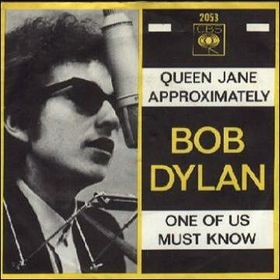
"One of Us Must Know (Sooner or Later)" is a song by the American singer-songwriter Bob Dylan, which was released as a single on February 14, 1966, and as the fourth track on his seventh studio album Blonde on Blonde in June of that year. The song was written by Dylan and produced by Bob Johnston. It is the narrator's account of a burned-out relationship. It was recorded at Columbia studio A in New York on January 25, 1966, with Dylan and other musicians developing the song through over twenty takes during the session.

"Tonight I'll Be Staying Here with You" is a song written by Bob Dylan from his 1969 album Nashville Skyline. It was the closing song of the album. The song was the third single released from the album, after "I Threw It All Away" and "Lay Lady Lay", reaching #50 on the US Billboard Hot 100 chart, and reaching the top 20 in other countries. It was anthologized on the compilation albums Bob Dylan's Greatest Hits Vol. II and Playlist: The Very Best of Bob Dylan '60s.

"Man Gave Names to All the Animals" is a song written by Bob Dylan that appeared on his 1979 album Slow Train Coming and was also released as a single in some European countries, becoming a chart hit in France and Belgium. It was also released as a promo single in the US. However, some have labelled it the worst song Dylan ever wrote. A 2013 reader's poll conducted by Rolling Stone magazine, ranked "Man Gave Names to All the Animals" as being the fourth worst Bob Dylan song, behind "Gotta Serve Somebody" in second place.
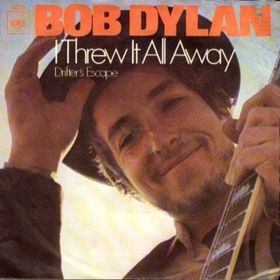
"I Threw It All Away" is a song by American singer-songwriter Bob Dylan. The track appeared on Dylan's album Nashville Skyline in 1969, and was released as its first single later that year, where it reached number 85 on the Billboard Hot 100, and number 30 on the UK Singles Chart. It is considered to be one of the best and most popular songs on the album.
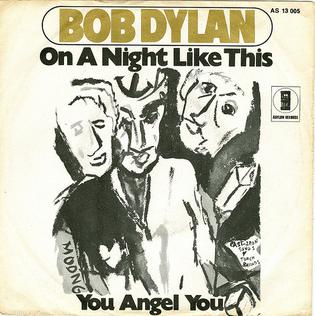
"On a Night Like This" is a song written by Bob Dylan and recorded in November 1973. It first appeared on Dylan's 14th studio album, Planet Waves, as the opening track. It was also released as the lead single from the album and reached #44 on the Billboard Hot 100 The song later appeared on several Dylan compilation albums including Biograph, in 1985, and Dylan, in 2007.

"Tight Connection to My Heart (Has Anybody Seen My Love)" is a song by Bob Dylan that was released on his 1985 album Empire Burlesque. As a single, it was a Top 40 Hit in New Zealand and Belgium. An earlier version of the song, entitled "Someone's Got a Hold of My Heart", was recorded for Dylan's 1983 LP Infidels, but was not included on that album; it later appeared on The Bootleg Series Volumes 1–3 (Rare & Unreleased) 1961–1991.
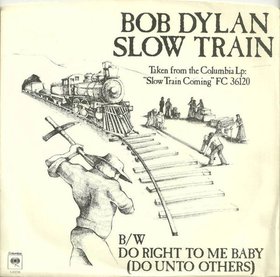
"Slow Train" is a song written by Bob Dylan that first appeared on his 1979 album Slow Train Coming. In the United States, it was released as the follow-up single to "Gotta Serve Somebody." It was also released as the lead song from Dylan's 1989 live album with the Grateful Dead, Dylan & the Dead. Music critic Paul Williams has called it "the one track [on Slow Train Coming] that must be listened to again and again and again, inexhaustible, essential." Rolling Stone editor Jann Wenner has called it "nothing less than Dylan's most mature and profound song about America". Cover art by Catherine Kanner
"Where Are You Tonight? " is a song by American singer-songwriter Bob Dylan, which was released as the closing track on his 18th studio album Street-Legal (1978). The song was written by Dylan, and produced by Don DeVito. Dylan has said that the song is about the individual's "enemy within." Critical interpretations of the song have suggested that it references Dylan's divorce as well as foreshadowing or announcing his conversion to Christianity, which became evident in the religiously-focused projects that followed the album. Commentators have also opined that there are allusions in the lyrics to the work of Robert Johnson.

"Obviously 5 Believers" is a song by the American singer-songwriter Bob Dylan, which was released as the last track of side three of his double album Blonde on Blonde (1966), and was the B-side to the single release of "Just Like a Woman" for releases in America and some other countries. The song was written by Dylan and produced by Bob Johnston. It was recorded at Columbia Music Row Studios, in the early morning hours of a March 9–10, 1966 session. Four takes were recorded, although the first two were incomplete. It has been interpreted as a blues song about loneliness, with critics noting similarities in melody and structure to Memphis Minnie's "Chauffeur Blues". Dylan's vocals and the musicianship of the band on the track have both received critical acclaim, although the track has been regarded as insubstantial by some commentators.
"New Pony" is a blues song by American singer-songwriter Bob Dylan, which was released on his 18th studio album Street-Legal (1978). The song was written by Dylan, and produced by Don DeVito. The song, which superficially concerns a pony called Lucifer who has broken a leg and needs to be put down, but has been interpreted as concerning Dylan's relationship with his backing singer Helena Springs. The song's composition is thought to have been influenced by earlier blues songs such as Son House's "Black Pony Blues" and Charley Patton's track "Pony Blues."

"One More Cup of Coffee (Valley Below)" is a song by American singer-songwriter Bob Dylan, which was released as the fourth track on his seventeenth studio album Desire (1976). The song was written by Dylan, and produced by Don DeVito. The album version of "One More Cup of Coffee (Valley Below)" was recorded on July 30, 1975, and released on Desire in January 1976. Dylan said the song was influenced by his visit to a Romani celebration at Saintes-Maries-de-la-Mer in France on his 34th birthday.
















